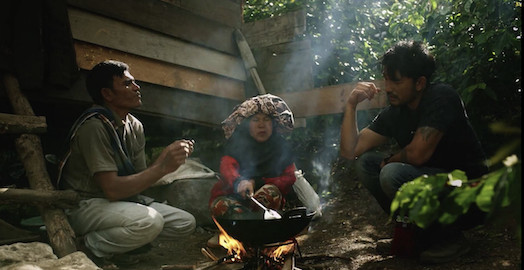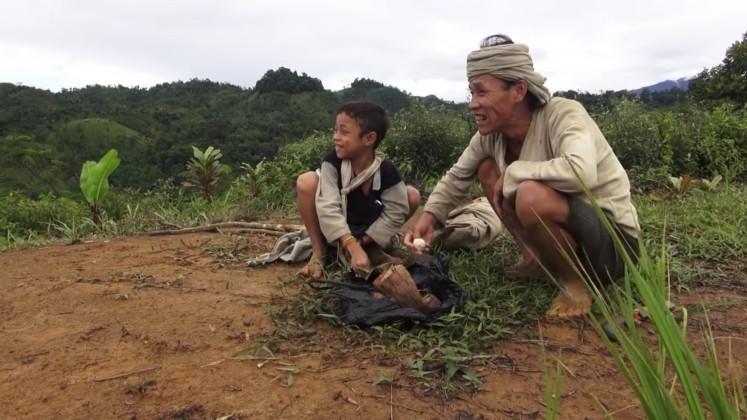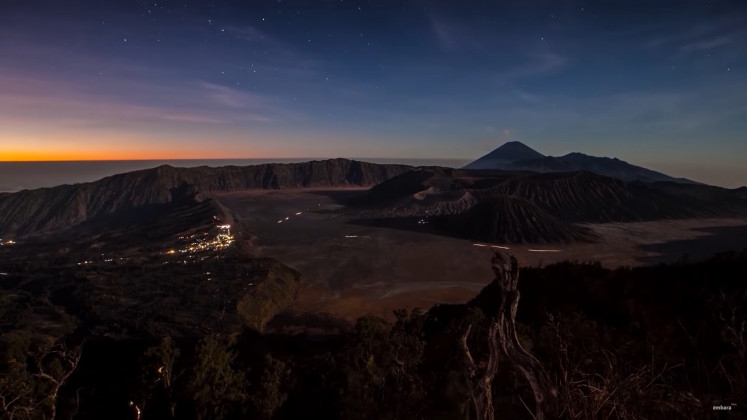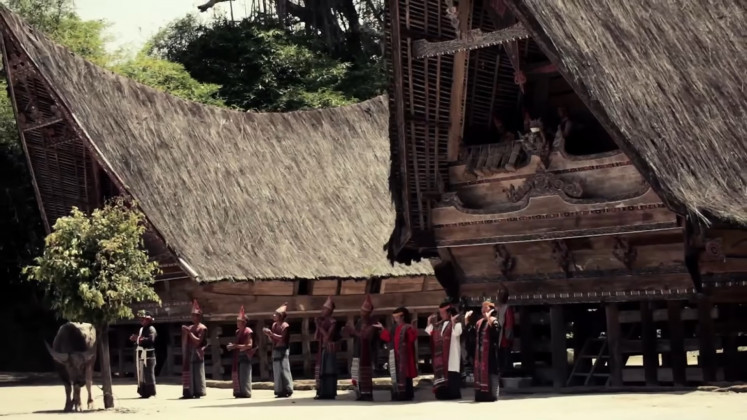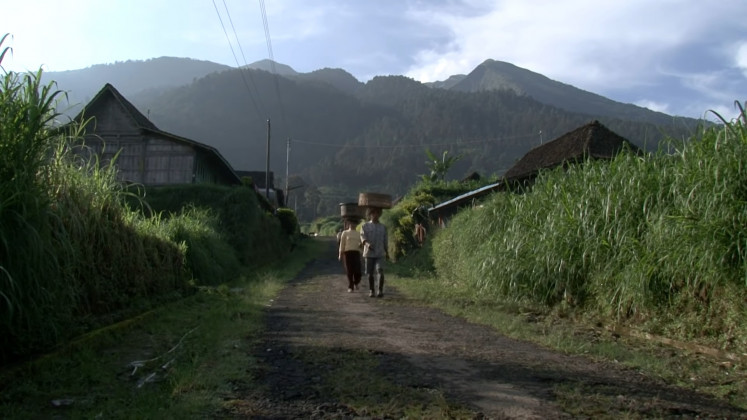Popular Reads
Top Results
Can't find what you're looking for?
View all search resultsPopular Reads
Top Results
Can't find what you're looking for?
View all search resultsIndonesia on screen: Five documentaries capture the archipelago's glory
As the pandemic forces us to stay indoors, we pick the best local documentaries to help you feel like you’re traveling around Indonesia to learn more about our rich cultural heritage.
Change text size
Gift Premium Articles
to Anyone
H
ome to a wide range of natural glory, from Sabang to Merauke, Indonesia is abundant in cultural gems not to be overlooked. While distance, cost and the current pandemic may constraint us from bearing witness to the uniqueness Indonesia has to offer, some documentaries let us escape the confines of our homes for scenarios that elicit a sense of pride and belonging.
Here are five rural documentaries made by local creators that serve as vehicles to higher appreciation of our cultural richness:
Filosofi Kopi: Aroma Gayo (2020)
Dir. Rahung Nasution / 27 minutes
Available on Bioskop Online (bioskoponline.com)
The film follows actor Rio Dewanto on his journey to the land of Gayo coffee, delving deep into what lies behind each sip of coffee. As the world's largest arabica-coffee-producing region, Gayo is a place that is close to the heart of coffee aficionados including Rahung Nasution, the documentary’s director.
"As someone who comes from (the) Mandailing (regency in North Sumatera), renowned as the world's best arabica producing region, coffee is a commodity that I hold dear not only for the taste but also for its history and impact," Rahung told The Jakarta Post.
In the making of his documentary, Rahung learned to appreciate Gayo coffee beyond its taste.
"I witnessed how local (Gayo) youngsters were constantly working collectively to popularize and elevate the dignity of Gayo coffee in the eyes of the world,” said.
The spirit and pride of its people is clearly portrayed in the documentary. Scenes like Gayo women singing while picking coffee cherries, and everyone enjoying their daily cuppas while chatting casually in groups, show how drinking coffee is a routine many Indonesians share.
Baduy (2015)
WatchDoc / 26 minutes
Available on YouTube
A still from 'Baduy', which focuses on the tribe (Baduy/Courtesy of 'Baduy')As the title suggests, Baduy tells the story of the Baduy, a small group of ethnic Sundanese who reside in Lebak regency, Banten province. Cocooning themselves in isolation without technology, the Baduy never fail to command our interest. In the span of 26 minutes, WatchDoc, the documentary's production house, presents a closer look at the Baduy people’s everyday life.
Baduy puts the spotlight on the candid conversations and day-to-day activities its subjects conduct. These activities include producing their popular gula aren (palm sugar). Letting the camera capture the simplicity of the Baduy people’s daily groove without interference, the documentary shows a way of life that puts tradition above everything else.
Baduy is part of a documentary series titled Ekspedisi Indonesia Biru (Blue Indonesia Expedition), created by journalists Dandhy Dwi Laksono and Ucok Suparta depicting how energy industries and infrastructure development impacts local lives.
Epic Java (2013)
Dir. Febian Nurrahman Saktinegara / 26 minutes
Available to purchase through epicjavafilms@gmail.com
A still from 'Epic Java' (Epic Java/Courtesy of Watchdoc)A narration-free documentary packed with panoramic shots of Java's landscapes, Epic Java goes the show-don’t-tell route to present the island’s sometimes-indescribable beauty. In the absence of words, it showcases Java’s history, culture and philosophy through visuals.
Incorporating a good amount of time lapses, Epic Java is often calming to watch. Its patient pace allows it time to breathe, and us as the audience to admire the richness of Java and its people at a casual pace.
The often-breathtaking visuals make it easy to admire the filmmaking team’s direction. For the film’s producer, Galih Mulya Nugraha, however, the most unforgettable part of the creation process went beyond the film itself.
"This film was made possible thanks to crowdfunding. While working on Epic Java, the majority of the creators were still in college and we were really thankful that, with the lack of material resources, Epic Java (was able to me made),” he told The Jakarta Post.
Batak, A Pilgrimage to Ancestor's Land
Dir. Mahatma Putra / 44 minutes
Available on YouTube
A still from 'Batak, A Pilgrimage to Ancestor’s Land' (Batak, A Pilgrimage to Ancestor’s Land/Courtesy of 'Batak, A Pilgrimage to Ancestor’s Land')In a short 44 minutes, Batak, A Pilgrimage to Ancestor's Land works hard to summarize the traditions and culture of the Batak people, an ethnic group originating from Sumatra. While it is not easy to succinctly present one of Indonesia's largest tribes in such a limited timeframe, the film is a welcome introduction to this specific cultural heritage while also telling the genesis of human existence through the Batak tribe's unique lens.
Director Mahatma Putra told The Jakarta Post that "Being Javanese, working on this documentary gave me a new perspective (on heritage). If there is a thing or two to learn, it is to keep my ancestors in high regard. And to prioritize collective value over my personal value. Being a Batak, after all, is (about) being selfless.”
Negeri di Bawah Kabut (2011)
Dir. Shalahuddin Siregar / 104 minutes
Available on YouTube
A still from 'Negeri di Bawah Kabut' (Negeri di Bawah Kabut/Courtesy of 'Negeri di Bawah Kabut')Indonesia has been long known as an agricultural country. This raises the question of how agriculture workers actually benefit from the sector. Negeri di Bawah Kabut (The Land Beneath the Fog) answers the question with a poignant reality of a community at Geniken village, somewhere on the slopes of Mount Merbabu, Central Java.
Focusing on the issue of climate change and people most-directly impacted, this award-winning documentary also puts the poverty issue into the mix. For urbanites, Negeri di Bawah Kabut feels like a wake-up call to realize the bubble we live in.
The documentary has been awarded the “2011 Special Jury Prize” at the Dubai International Film Festival's Muhr Asia/Africa Documentary category and as “Best Debut Documentary” at the 2013 Almaty International Film Festival.

